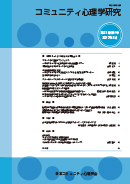Volume 17, Issue 2
Displaying 1-9 of 9 articles from this issue
- |<
- <
- 1
- >
- >|
Special Issues
-
2014Volume 17Issue 2 Pages 109-110
Published: March 28, 2014
Released on J-STAGE: May 24, 2019
Download PDF (74K) -
2014Volume 17Issue 2 Pages 111-130
Published: March 28, 2014
Released on J-STAGE: May 24, 2019
Download PDF (1079K) -
2014Volume 17Issue 2 Pages 131-144
Published: March 28, 2014
Released on J-STAGE: May 24, 2019
Download PDF (762K) -
2014Volume 17Issue 2 Pages 145-165
Published: March 28, 2014
Released on J-STAGE: May 24, 2019
Download PDF (2932K) -
2014Volume 17Issue 2 Pages 166-181
Published: March 28, 2014
Released on J-STAGE: May 24, 2019
Download PDF (1088K)
Original Article
-
2014Volume 17Issue 2 Pages 182-198
Published: March 28, 2014
Released on J-STAGE: May 24, 2019
Download PDF (832K) -
2014Volume 17Issue 2 Pages 199-218
Published: March 28, 2014
Released on J-STAGE: May 24, 2019
Download PDF (1102K) -
2014Volume 17Issue 2 Pages 219-238
Published: March 28, 2014
Released on J-STAGE: May 24, 2019
Download PDF (1036K)
Book Review
-
2014Volume 17Issue 2 Pages 239-241
Published: March 28, 2014
Released on J-STAGE: May 24, 2019
Download PDF (129K)
- |<
- <
- 1
- >
- >|
